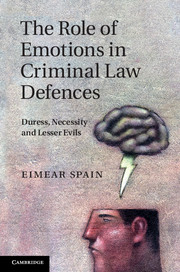2 - The role of emotions in legal theory
Published online by Cambridge University Press: 07 October 2011
Summary
The emotions have always been of central concern to men. In every endeavour, in every major human enterprise, the emotions are somehow involved.
Emotions dominate human action and their importance to human behaviour and consequential importance to the criminal law must be recognised. Emotions are of relevance to the criminal law on a number of levels, from the role they play in punishment to the emotional experiences of victims. The effect of emotions on behaviour and how the emotions experienced by perpetrators of crime should affect the attribution of responsibility and punishment is of interest to criminal theory and to the defences of duress and necessity in particular. However, the role of emotions in conditioning individual responsibility has not featured significantly in criminal theory and doctrine to date. At best, the criminal law and its literature has intermittently considered the issues raised and this raises the question of how the conception of criminal responsibility in law should accommodate the modern understanding of emotions and human behaviour.
A major challenge for the law is to formulate a compelling reason why it facilitates either partial or complete exculpation on the basis of some emotions such as anger but not others such as fear. The law has adopted a piecemeal approach and accepted defences based on some emotions but refused to acknowledge the role of other emotions in offender behaviour. For example, under Irish law, the defence of provocation reduces a charge of murder to manslaughter when anger causes the defendant to lose self-control. Yet, the law does not allow any defence to an individual who kills an innocent person in fear for his or her life or the life of a loved one due to threats from another individual or difficult circumstances. Although the defences of duress and necessity are available for crimes of a lesser magnitude, their basis is not the fear experienced by the defendant. It has been suggested that in self-defence, duress and necessity ‘fear is . . . the dominant psychological state of the person pleading any of these defences’, a fact which is not reflected in the rationale of those defences. Reilly and Mikus observe that:
[t]he possibility of losing self-control as a result of extreme fear is never mentioned in the defences of duress and self-defence. Under extreme fear in the face of duress the actor is understood always to be capable of choosing whether or not to submit to the threat.
- Type
- Chapter
- Information
- The Role of Emotions in Criminal Law DefencesDuress, Necessity and Lesser Evils, pp. 66 - 112Publisher: Cambridge University PressPrint publication year: 2011



